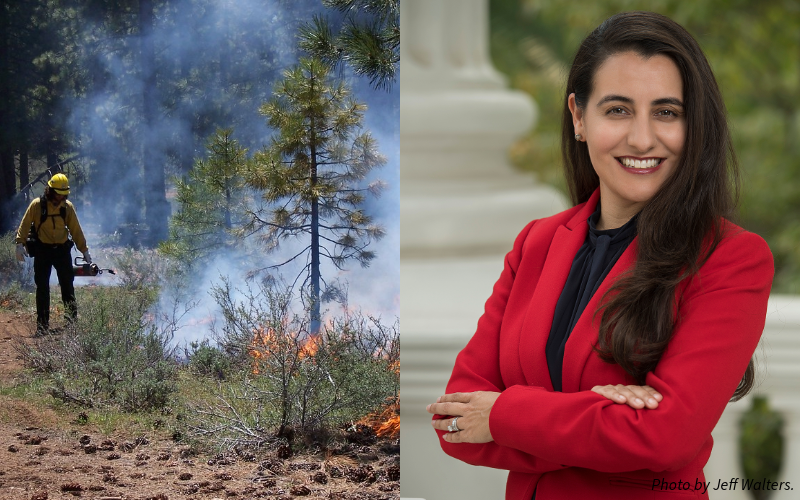FOREST FLASH
February 2024
In Pacific Forest Trust’s e-newsletter, Forest Flash, we send you the most recent PFT news and updates on forests, clean water, climate, and wildlife. Subscribe here.

Senator Monique Limón (D), who represents the state’s 19th district, has just introduced SB1101, which seeks to expand California’s use of beneficial fire to reduce the catastrophic wildfires and increase beneficial fire. Sponsored by PFT, the bill would facilitate significant increases in beneficial fire management, including the reduction of the excessive build-up of vegetation that fuels devastating wildfires, use of Indigenous fire practices, prescribed burning, and natural fire management—all of which help rejuvenate our forests and grasslands.
The bill lays out a few key ways that California can begin to tangibly improve forest conditions so that fires do not burn out of control.To increase the amount of “good fire” on the ground at the pace and scale required to ensure public safety and restore healthy forests and habitats, SB1101 identifies the changes necessary to streamline CAL FIRE’s contracting and procurement processes to make it easier for both their organization and landowners to implement large-scale prescribed burns in a timely manner. This call for the reform of CAL FIRE’s prescribed-burns permitting process echoes a recommendation in the AB1757 Expert Advisory Committee Report. The recommendation also urges the agency to utilize the same systems and authorizations for managed/prescribed burns as those deployed for fire-suppression efforts.
SB1101 would also establish a more proactive and collaborative approach to planning for fire management, encouraging coordination between federal, state, tribal, local, and private entities to generate a network of potential fire boundaries to guide both wildfire response and preemptive use of “good fire.” We urge California legislators to take the steps necessary to enact this bill.

Oregon’s “short” legislative session kicked off on February 5th and will run for 35 days, ending on March 10th. During the short session, each legislator can only introduce up to two personal bills, which results in a lean but focused pool of policy proposals. Within that group, there are several exciting bills that PFT is supporting:
-
HB 4014 creates a $1.5M grant program to promote beaver coexistence on private land. Eligible expenditures include tree protection tools, flood protection devices, culvert protection systems, and other strategies to promote coexistence over killing.
-
HB 4060 appropriates $10.8M in funding for the Oregon Agricultural Heritage Program (OAHP), one of the few existing funding programs for private land conservation in Oregon. OAHP went unfunded last session, which was a major disappointment for the conservation community, but we are optimistic we can get it over the finish line this time around.
-
HB 4148 is a wildlife omnibus bill that expands capacity to combat wildlife disease, strengthens invasive species prevention and response, establishes a program to promote wildlife coexistence, and improves guidance around wildlife corridors and crossings.
-
SB 1559 updates Oregon’s outdated greenhouse gas reduction targets to reflect the best available science consistent with limiting global warming to 1.5 degrees Celsius.
-
SB 1593 raises funds for wildfire protection by imposing a tax on timber harvest proceeds on private land holdings larger than 500 acres. The tax rate ranges from 1% for holdings of 500-1,000 acres to 6% for holdings greater than 5,000 acres.
Please consider a donation to the Pacific Forest Trust. Your help—in all capacities—makes our work possible. Thanks for supporting us as we support forests!

Since we began screening Beyond the Trees at festivals and showings last year, it has received much praise and numerous laurels, including Best Environmental Film at the Los Angeles Documentary Film Festival. Now the film, about our innovative work on the van Eck forests of Oregon and California, is headed to London to be shown at the 9th annual Sustainability Week, hosted by the Economist! On March 6th, PFT President Laurie Wayburn will be joined by two key film collaborators Tom Butcher, VanEck’s ESG director, and Anthony Gibbs of Imaginary Forces, who directed the film, in a panel discussion after the film is screened at the closing plenary session. The panel will discuss the project, as well as how landowners can scale forests’ ability to mitigate the effects of climate change in a way that retains the financial gains of their productive timberlands.
As detailed in Beyond the Trees, PFT has long been pioneering some of the very integrative business models that individuals from all around the world are venturing to London to learn about. Our unique conservation and management model developed on the van Eck forests blends conservation with finance, restoring forests to their more natural carbon stores and forest function, enhancing biodiversity, protecting watersheds, creating climate solutions—all while providing the wood products we all use, and the jobs which sustain entire rural economies.
If you cannot make it across the pond for this event, not to worry, as we are planning more stateside screenings of Beyond the Trees for the year. And, if you are interested in hosting a screening or featuring BTT at your film festival, please reach out to ehager@pacificforest.org.
ICYMI
In case you missed it (ICYMI), here are some other exciting things PFT has been involved in lately!
- PFT President Laurie Wayburn wrote a recent op-ed for Capitol Weekly, which lays out the case for why California must invest in its natural and working lands on par with investments in the green energy and sustainable transportation sectors to meet the climate crisis.
- Author John J. Berger just published a book, Solving the Climate Crisis, which features a chapter on PFT’s innovative work, including our ongoing efforts to promote the role of forests, as well as empower private forestland owners, in larger actions on climate solutions. “PFT,” writes Berger, “is demonstrating that managing a natural forest is not only much more productive for water, wildlife, and the climate, but also far less risky for the forest owner.”
- Our Development Director, Kevin Connelly, was recently featured in a video for TechSoup; he explains all the tools, resources, and technologies employed to advance the PFT mission and message.


